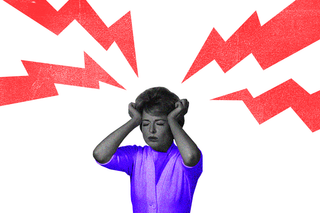
How Stress Alters Brain Processes, Making People More Vulnerable to Disorders
“The new findings are important for developing more individualized diagnoses and personalized therapies.”

Scientists have known for a long time that stress — especially prolonged or chronic — alters how the brain functions. A new study allowed scientists to observe the alteration in real-time — offering compelling insights into how stressful situations change the network systems in the brain.
“We were able to show for the first time how important individual patterns of the stress response in the brain are, to better understand the experience of stress — including the unfavorable after-effects of stress,” said Nils B. Kroemer from the University of Tübingen in Germany, who co-authored the study.
Published in Biological Psychiatry, the study assessed the brain responses of 217 participants — with and without mood and anxiety disorders — in the face of acute stress. Inside an MRI scanner, the participants were asked to solve math problems under time pressure — rather stressful, to begin with. Then, irrespective of how their performance was, the participants were provided negative feedback to their performance — further amplifying the stress.
The researchers simultaneously tracked the participants’ brain processes before and after the period of acute stress, i.e., during the process of anticipation and recovery. Besides brain imaging, the researchers also measured the participants’ heart rates and the levels of cortisol, a stress hormone, in their bodies.
Theynoticed that during periods of acute stress, different brain networks modified their communication processes.
Related on The Swaddle:
Workplace Burnout Can Damage Confidence, Relationships for Years
“Our study shows not only where changes occur, but how different brain regions interact and how their communication changes over the course of the situation,” said Anne Kühnel from the Max Planck Institute of Psychiatry in Germany, who was the first author of the study. In other words, they were able to see how stress changed different brain networks.
Past research suggests that chronic stress can lead to cognitive impairment and loss of sociability in individuals. This happens when the regulation of synapses — which “connect neurons in the brain to neurons in the rest of the body and from those neurons to the muscles” — in people’s brains is disrupted. This makes individuals seem “grouchy, grumpy, nasty, distracted, or forgetful” when they’re stressed. Synapses “connect neurons in the brain to neurons in the rest of the body and from those neurons to the muscles”
Not only that, but studies have also shown that even a single stressful situation can kill brain cells in the hippocampus, which plays a role in learning and memory. Chronic stress was also found to lead to a loss in brain volume, resulting in emotional impairment.
“Cortisol is believed to create a domino effect that hard-wires pathways between the hippocampus and amygdala in a way that might create a vicious cycle by creating a brain that becomes predisposed to be in a constant state of fight-or-flight,” Christopher Bergland, a science writer, explained in an article on Psychology Today. “Chronic stress has the ability to flip a switch in stem cells that turns them into a type of cell that inhibits connections to the prefrontal cortex… but lays down durable scaffolding linked to anxiety, depression, and [PTSD],” he continued.
Related on The Swaddle:
Stress, Anxiety, Depression During Pregnancy Can Affect Fetal Brain Development: Study
Besides impacting everyday brain function, stress also affects heart health and puts people at a greater risk of developing dementia, experts note.
The present study not only adds to the body of knowledge on how stress impacts the brain but also gave scientists greater insight into mental disorders. “The altered communication between brain regions supports the theory that mental disorders are network diseases in which the interaction of neural units is disturbed,” said Elisabeth Binder, Kühnel’s colleague and co-author of the study.
The impact of stress on our biology assumes greater importance at a time when we’re living through major health and social disruptions — amplifying stress for many.
Kroemer believes its findings may help scientists develop customized approaches to treating stress-related disorders. “In the future, we could use our dynamic models of brain response to study… the targeted effects of drugs that might improve the stress response in high-risk individuals.”
Devrupa Rakshit is an Associate Editor at The Swaddle. She is a lawyer by education, a poet by accident, a painter by shaukh, and autistic by birth. You can find her on Instagram @devruparakshit.
Related


Why Invalidating People’s Pain Can Lead Them to Experience Depression
